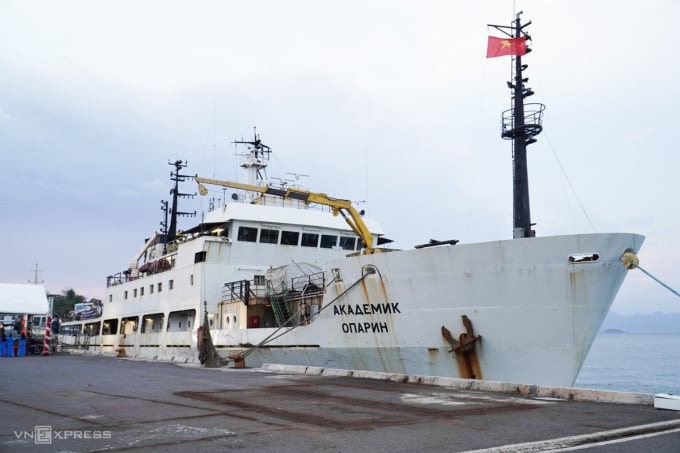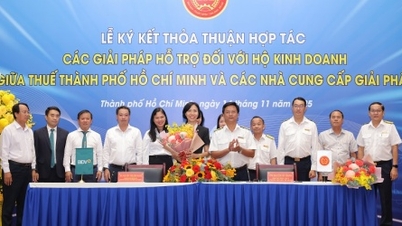Khanh Hoa A Russian ship, docking at Nha Trang port, will set sail with nearly 40 scientists to conduct a month-long survey in Vietnam's waters.
On May 17, the Russian scientific research vessel named "Academician Oparin" docked at Nha Trang port, preparing for the 8th survey trip in Vietnam's waters to study marine biological resources. The survey trip is part of the "Cooperation Roadmap in Marine Research for the 2018-2025 period" between the Vietnam Academy of Science and Technology (VAST) and the Russian Academy of Sciences (RAS).
At the ceremony, Prof. Dr. Chau Van Minh, President of VAST, reviewed many outstanding results from the previous 7 joint survey trips between the two countries, especially the young scientists of VAST who have matured through the surveys and scientific cooperation.

The ship "Academician Oparin" docked at Nha Trang port on May 17. Photo: Bui Toan
Mr. Konstatin Mogilevsky, Deputy Minister of Science and Higher Education of Russia, also highly appreciated the cooperation process between the two academies, especially the cooperation content on marine science which has been effectively implemented.
In this research, the Vietnamese side had the participation of 19 scientists from specialized research units of the Vietnam Academy of Science and Technology.
Mr. Le Huu Hoang, Vice Chairman of Khanh Hoa province, said that through previous survey trips, scientists from the two countries have achieved important research results on biodiversity, discovering quality bioactive compounds in the marine environment.
Mr. Hoang said that it is necessary to increase the presence of scientific research forces and also create conditions for international scientists to participate in research surveys in the East Sea, helping to promote Vietnamese marine science in the international arena.
The marine research vessel "Academician Oparin" and scientists from both countries have previously conducted many surveys in Vietnam's waters. In particular, scientists have studied the composition of coral reefs; the accumulation of heavy metals in mollusks and active ingredients in marine microorganisms... exploited at depths of hundreds of meters in different weather and temperature conditions; collected hundreds of specimens in the East Sea.
The Russian Academy of Sciences' marine research vessel Academician Oparin is 75.5 meters long and displaces 2,441 tons. The vessel can sail for long periods, with enough space for 36 scientists, 5 laboratories, and 30 crew members. Oparin is also equipped with many modern devices to help dive in the sea and collect samples in deep sea areas.
Bui Toan
Source link





![[Photo] General Secretary To Lam and National Assembly Chairman Tran Thanh Man attend the 80th Anniversary of the Traditional Day of the Vietnamese Inspection Sector](https://vphoto.vietnam.vn/thumb/1200x675/vietnam/resource/IMAGE/2025/11/17/1763356362984_a2-bnd-7940-3561-jpg.webp)

















































































































Comment (0)